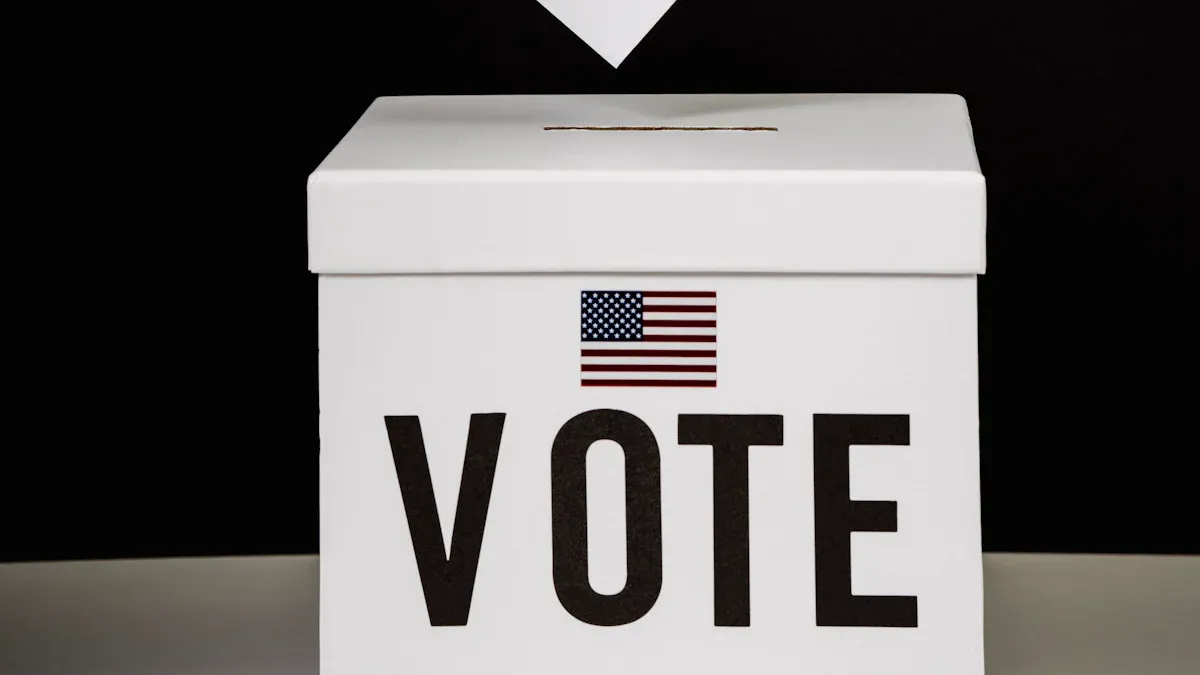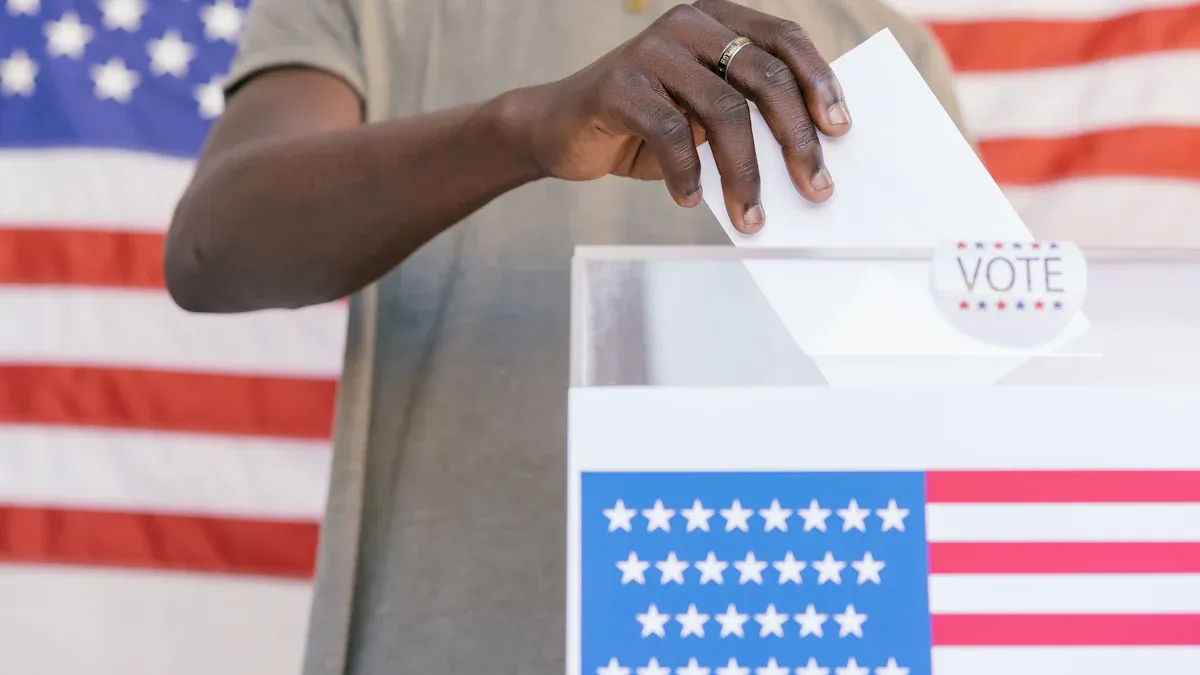- EasyCard
- Trade
- Help
- Announcement
- Academy
- SWIFT Code
- Iban Number
- Referral
- Customer Service
- Blog
- Creator
Can Green Card Holders Vote? A Detailed Analysis of Voting Rights

Image Source: pexels
Regarding the question “Can green card holders vote?”, federal law provides a clear negative answer. As of January 2023, there are approximately 12.7 million lawful permanent residents in the United States, none of whom have the right to vote in federal elections such as presidential or congressional elections. This restriction also applies to the vast majority of state and local elections.
Important Warning: The consequences of illegal voting are extremely severe. Such actions may not only result in revocation of the green card but also carry the risk of deportation.
Key Points
- Green card holders cannot vote in U.S. federal, state, or most local elections.
- Illegal voting carries serious consequences, including fines, imprisonment, revocation of the green card, and even deportation.
- Becoming a U.S. citizen is the only legal way for green card holders to obtain full voting rights.
- Green card holders can participate in public life by engaging in community activities, attending public hearings, and contacting elected representatives.
Can Green Card Holders Vote: The Clear Legal Answer

Image Source: pexels
For the core question “Can green card holders vote,” the answer is deeply rooted in the U.S. legal system. The law clearly ties voting rights to citizenship, thereby excluding lawful permanent residents from federal elections. Understanding these legal provisions is key for every green card holder to protect their status.
Federal Law Provisions
U.S. federal law is the highest standard for defining voting eligibility. It makes unambiguous provisions regarding who has the right to vote in national elections.
Legal Basis: 18 U.S. Code § 611 clearly states that it is illegal for any non-U.S. citizen to vote in federal elections (such as presidential or congressional elections). This statute is designed to ensure that the federal government’s electoral process is participated in only by its citizens.
The U.S. Citizenship and Immigration Services (USCIS) Policy Manual also reinforces this position from the perspective of immigration law. The manual emphasizes that voting rights are not a privilege of green card holders. If a permanent resident falsely claims to be a U.S. citizen to register to vote or participate in voting, this behavior will be considered evidence of lacking “good moral character.” This directly jeopardizes future naturalization applications and is an extremely dangerous pitfall on the immigration path.
General Restrictions in State Laws!
In addition to federal-level prohibitions, the vast majority of U.S. states and local governments similarly limit voting rights to U.S. citizens. States have the authority to establish their own election rules, but they generally follow federal guiding principles.
In recent years, many states have even adopted stricter measures to verify voters’ citizenship.
- Indiana and Wyoming require some voters to present a passport or birth certificate when registering.
- Tennessee legislation requires election officials to consult the state government’s citizenship database before processing voter registrations.
- Florida has made non-citizen voting a new felony, and even if the individual mistakenly believes they are eligible to vote, they may face criminal charges.
Historically, non-citizen voting existed in some areas of the United States. However, starting from the early 20th century, this right was systematically eliminated.
The following table shows the historical process of some states revoking non-citizen voting rights, reflecting the long-term trend of tying voting rights to citizenship.
| State | Year Non-Citizen Voting Rights Were Revoked |
|---|---|
| Illinois | 1848 |
| Alabama | 1901 |
| Colorado | 1902 |
| Wisconsin | 1908 |
| Oregon | 1914 |
| Kansas | 1918 |
| Indiana | 1921 |
| Texas | 1921 |
| Arkansas | 1926 |
Difference Between Citizenship and Residency
So, can green card holders vote? The answer is no, and the fundamental reason lies in the essential difference in political rights between “citizenship” and “lawful permanent residency.” A green card grants foreigners the right to live and work permanently in the United States, but in terms of political rights, there is a clear boundary between it and citizenship.
| Right Type | U.S. Citizen | Lawful Permanent Resident (Green Card Holder) |
|---|---|---|
| Voting Rights | ✅ Full voting rights in all federal, state, and local elections. | ❌ No right to vote in federal and most state and local elections. |
| Holding Public Office | ✅ Can run for most federal, state, and local public offices. | ❌ Cannot hold any elected public office. |
| Political Influence | ✅ Can directly influence national policies and law-making through ballots. | ❌ Cannot directly participate in decision-making processes affecting their community through voting. |
In short, voting rights are regarded as the embodiment of the contract between citizens and the state, and are the core way for citizens to participate in national governance and determine the country’s future. Although green card holders are legal members of American society, they have not yet sworn allegiance to the United States under the law, and therefore do not possess this most critical political right.
Serious Consequences of Illegal Voting

Image Source: pexels
Many green card holders may harbor wishful thinking about voting due to misunderstandings or lack of information. However, the consequences of such behavior far exceed most people’s imagination; it not only violates criminal law but may also cause fatal and irreversible damage to immigration status. On the question of “Can green card holders vote,” any attempt is tantamount to a high-risk gamble.
Criminal Penalty Risks
First, non-citizen voting is a federal crime. The law has clear penalty provisions for this, and no one can evade responsibility on the grounds of “ignorance of the law.”
According to 18 U.S. Code § 611, non-U.S. citizens who register to vote or vote in federal elections will face serious criminal charges. Specific penalty measures include:
- High Fines: The court may order the offender to pay fines.
- Imprisonment: Up to one year in prison.
- Both: In some cases, fines and imprisonment may be imposed simultaneously.
These criminal penalties are not empty legal provisions but real cases occurring in practice. In recent years, judicial departments across the United States have prosecuted multiple cases of illegal voting by non-citizens.
| Case Description | Voting Year | Number Prosecuted | Charges |
|---|---|---|---|
| 19 foreign citizens prosecuted for illegal voting | 2016 | 19 | Falsely claiming U.S. citizenship to register to vote and voting illegally; or voting as foreigners; or fraud and visa abuse combined with illegal voting |
| 3 non-citizens arrested for illegal voting | 2024 | 3 | Perjury (falsely claiming U.S. citizenship and no felony record on voter registration forms) and violation of election laws (illegal voting) |
These cases clearly indicate that law enforcement agencies have a zero-tolerance attitude toward illegal voting behavior.
Fatal Blow to Immigration Status
For green card holders, what is more terrifying than criminal penalties is the far-reaching impact on their immigration status. Illegal voting behavior will be regarded by the immigration authorities as ironclad evidence of lacking “good moral character” (Good Moral Character).
What is a “Crime Involving Moral Turpitude” (CIMT)? In immigration law, “Crime Involving Moral Turpitude” (CIMT) does not have a fixed legal definition. However, case law generally describes it as behavior that “shocks the public conscience and is inherently base, vile, or depraved.” It usually involves acts with malicious or deceptive intent.
Deliberately falsely claiming to be a U.S. citizen to vote fully meets the definition of “moral turpitude.” Once identified, it becomes an almost insurmountable obstacle when applying for naturalization. Immigration officers strictly evaluate the applicant’s past behavior records when reviewing naturalization applications. Any records related to illegal voting may directly lead to rejection of the naturalization application.
Revocation of Green Card and Deportation
The most severe consequence is that illegal voting is one of the reasons explicitly stipulated by law for being deportable (Deportable Offense). This means that green card holders will not only lose their permanent residency but will also be forcibly removed from the United States.
⚠️ Legal Warning: Direct Basis for Deportation According to Section 237(a)(6)(A) of the Immigration and Nationality Act (INA), any foreigner who votes in violation of federal, state, or local laws will be classified as deportable. This provision is enforced very strictly with almost no room for exemptions.
The Board of Immigration Appeals (BIA) in the famous Matter of Fitzpatrick case has confirmed that regardless of whether the individual knew their voting behavior was illegal, as long as the voting act was carried out, the conditions for deportation are met. This means that once the voting fact is established, the risk of green card revocation and deportation will immediately descend.
Legal Liability for “Unintentional Mistakes”
Some people may argue that they registered to vote or voted unknowingly or under misinformation, such as accidentally checking the voter registration option when updating their driver’s license. However, in immigration court, “unintentional mistake” is generally not a valid defense.
Immigration courts consider illegal voting a “general intent” crime. This means the court focuses on whether you performed the act of “voting,” not whether you “intended to violate the law.” In the Matter of Fitzpatrick case, the court clearly ruled that even if a non-citizen claims their voting was unintentional, they still face the risk of deportation.
Although this precedent proposed an extremely narrow exception (for example, if the ballot includes both federal elections and local elections that non-citizens are entitled to participate in, and the two can be clearly separated), in reality, almost no elections can meet such stringent standards. Therefore, for green card holders, avoiding any behavior related to voter registration and voting is the only safe choice to protect their status.
Rare Exceptions: Non-Citizen Voting Permissions
Although federal and state laws generally prohibit non-citizen voting, in some specific areas of the United States, there are indeed rare exceptions allowing lawful residents to participate in local elections. These exceptions are very limited, applying only to specific municipal or school district elections with strict eligibility restrictions. Green card holders must exercise extreme caution and not confuse them with voting rights in federal or state elections.
Limited to Specific Local Elections
Non-citizen voting rights exist only at the local level and are permitted in only a few jurisdictions. As of 2025, these areas are mainly concentrated in the District of Columbia and certain cities in California, Maryland, and Vermont. These laws authorize eligible non-citizen residents to vote only in local matters such as mayoral elections, city council elections, or school district committee elections.
Municipal Election Exceptions
In terms of municipal elections, Maryland is at the forefront. Several cities within the state allow non-citizens to participate in local voting, including:
- Takoma Park
- Hyattsville
- Frederick
- Greenbelt
Taking Takoma Park as an example, non-citizen residents can register to vote in city-level elections as long as they meet the following conditions:
- Be a resident of the city.
- Be at least 16 years old on or before election day.
- Not registered to vote anywhere else.
However, such laws often face legal challenges.
| Case/Location | Legal Challenge Content | Current Status/Outcome |
|---|---|---|
| New York City | Challenge to law allowing non-citizens to vote in local elections | Appellate court ruled it violates state constitution and revoked it |
| District of Columbia | Challenge to non-citizen voting law | District court upheld the law, but Congress attempted to prevent it from taking effect |
| Burlington, Vermont | Challenge to non-citizen voting law diluting citizen voting rights | Court dismissed the lawsuit, upholding the law |
Specific School District Election Permissions
Another common type of exception is allowing non-citizen parents or guardians to vote in school district elections. This aims to enable the groups most relevant to the school system’s interests to participate in decision-making. For example:
- San Francisco and Oakland, California: Allow non-citizen parents or guardians of students to vote in school board elections.
- Chicago: Allows non-citizen parents to vote in local school council elections and is pushing to extend this right to entire school district elections.
In San Francisco, non-citizen parents must meet specific requirements, such as being a San Francisco resident and the parent or legal guardian of a minor child residing in the city.
Verification Obligation Before Voting
Important Note: Given the complexity and regional limitations of these exceptions, green card holders bear an absolute obligation to verify before considering participation in any voting activity. Before registering or voting, they must proactively inquire and confirm with the local city or county election office to obtain clear legal provisions regarding non-citizen voting eligibility. Any assumptions or misunderstandings may lead to catastrophic immigration consequences.
The Only Way to Obtain Voting Rights
For green card holders who wish to have a voice in U.S. political life, the law points to one and only legal path: naturalization to become a U.S. citizen. This is the legal process of transitioning from “permanent resident” to “national citizen” and is the only key to unlocking full voting rights.
Naturalization to Become a Citizen
Naturalization is a formal legal process. Through this process, applicants demonstrate their identification with and willingness to pledge allegiance to American values. To qualify for naturalization, green card holders must meet a series of strict conditions stipulated by U.S. Citizenship and Immigration Services (USCIS).
Core Requirements for Naturalization Application:
- Age Requirement: Must be at least 18 years old at the time of application.
- Residency Period: Must have continuously resided in the United States as a lawful permanent resident (green card holder) for 5 years; if married to a U.S. citizen, the residency period is reduced to 3 years.
- Physical Presence: Must have been physically present in the United States for at least half of the required residency period.
- Good Moral Character: Must maintain good moral character during the statutory period; any criminal record may affect the application.
- Language and Knowledge: Must possess basic English reading, writing, and speaking abilities and pass a U.S. history and government knowledge test (exemptions exist based on age and residency period).
- Oath of Allegiance: Finally, the applicant must take an oath of allegiance to the United States before a judge.
Full Voting Rights Enjoyed by Citizens
Once the oath is completed and the individual officially becomes a U.S. citizen, they obtain full political participation rights. The law clearly stipulates that naturalized citizens enjoy exactly the same rights and privileges as native-born citizens, especially in terms of voting rights. This means that all previous restrictions regarding “Can green card holders vote” will cease to exist.
After becoming a citizen, the individual will obtain full political rights, the most core of which include:
- ✅ Voting in all federal, state, and local elections: Whether in presidential elections, congressional elections, or gubernatorial or mayoral elections, citizens have the right to cast their vote.
- ✅ Running for Public Office: Can run for most federal, state, and local public offices requiring citizenship.
Therefore, for green card holders who aspire to influence their community and the country’s future through ballots, actively preparing for and completing the naturalization process is the only legal way to achieve this goal.
Other Ways for Green Card Holders to Participate in Public Affairs
Although the law restricts green card holders’ voting rights, this does not mean they cannot participate in public affairs or influence community decisions. In fact, green card holders have multiple legal and influential channels to make their voices heard and contribute to community development.
Participating in Community Organizations
Joining community organizations is one of the most direct ways for green card holders to participate in public life. These organizations typically focus on specific community issues, such as education, environment, public safety, or immigrant rights. By becoming members, individuals can work with like-minded neighbors to jointly promote positive changes in the community. They can participate in advocacy activities, help organize community projects, and directly influence local policies closely related to their lives.
Attending Public Hearings
Local governments (such as city councils, county governments, or school district committees) regularly hold public hearings to discuss various issues from urban planning to budget allocation. Green card holders have full rights to attend these meetings. At the hearings, they can speak publicly to express support or opposition to a proposal. This provides them with a formal platform to directly present their views to elected officials and influence final decisions.
Contacting Elected Representatives
The duty of elected representatives is to serve all residents in their districts, not just the citizens who voted for them. Therefore, green card holders can contact their congressional representatives, state legislators, or city council members at any time by writing letters, sending emails, or making phone calls. Expressing their views on a specific bill or community issue is a very effective way of political participation.
Participating in Volunteer Service
Volunteer service is an excellent way to give back to the community, build social connections, and exert positive influence. The range of volunteer activities that green card holders can participate in is very broad, including supporting non-profit organizations as well as serving in government agencies.
Examples of Participation Channels:
- Find volunteer opportunities in the local community through national platforms such as
Serve.gov.- Participate in activities organized by advocacy groups, such as assisting with community outreach or education projects.
- Serve as volunteers in public land and natural resource management projects of agencies such as the National Park Service (NPS).
- Provide non-voting assistance in political campaign activities, such as attending rallies or volunteering for candidates.
These activities not only bring personal fulfillment but also allow green card holders to substantially participate in American civic life without being able to vote.
The core conclusion of the article is very clear. For the question “Can green card holders vote,” the answer is an absolute no. According to U.S. Citizenship and Immigration Services regulations, voting rights are exclusive to citizens. Any attempt at illegal voting may lead to serious consequences such as revocation of the green card or even deportation. The only legal way to obtain full voting rights is to complete naturalization and become a U.S. citizen.
Nevertheless, permanent residents can still participate in public life and make their voices heard through various legal means such as community service and contacting elected representatives.
FAQ
I accidentally registered to vote when updating my driver’s license. What should I do?
Green card holders should immediately contact the county election office where they reside and request in writing to cancel their voter registration. Retain all communication records as evidence. Proactively correcting the error is a key step in protecting immigration status; do not assume that not voting will resolve the issue.
Can I participate in mayoral or school board elections?
In the vast majority of cases, no. Only a very few specific cities allow non-citizens to participate in local elections. Green card holders bear an absolute obligation to verify eligibility with the local election office before voting. Any assumptions may bring serious risks.
Can green card holders donate to political campaigns?
Yes. According to federal law, green card holders have the right to donate to candidates, parties, and political action committees (PACs) in federal elections. However, state and local laws may have different provisions, so it is best to verify before donating.
If I voted in the past due to not understanding the regulations, what will be the consequences?
This is a very serious legal issue. Illegal voting may lead to revocation of the green card and deportation. The individual should immediately stop any voting behavior and consult an experienced immigration attorney as soon as possible to assess the specific situation and possible remedial measures.
*This article is provided for general information purposes and does not constitute legal, tax or other professional advice from BiyaPay or its subsidiaries and its affiliates, and it is not intended as a substitute for obtaining advice from a financial advisor or any other professional.
We make no representations, warranties or warranties, express or implied, as to the accuracy, completeness or timeliness of the contents of this publication.




Contact Us
Company and Team
BiyaPay Products
Customer Services
is a broker-dealer registered with the U.S. Securities and Exchange Commission (SEC) (No.: 802-127417), member of the Financial Industry Regulatory Authority (FINRA) (CRD: 325027), member of the Securities Investor Protection Corporation (SIPC), and regulated by FINRA and SEC.
registered with the US Financial Crimes Enforcement Network (FinCEN), as a Money Services Business (MSB), registration number: 31000218637349, and regulated by FinCEN.
registered as Financial Service Provider (FSP number: FSP1007221) in New Zealand, and is a member of the Financial Dispute Resolution Scheme, a New Zealand independent dispute resolution service provider.


















